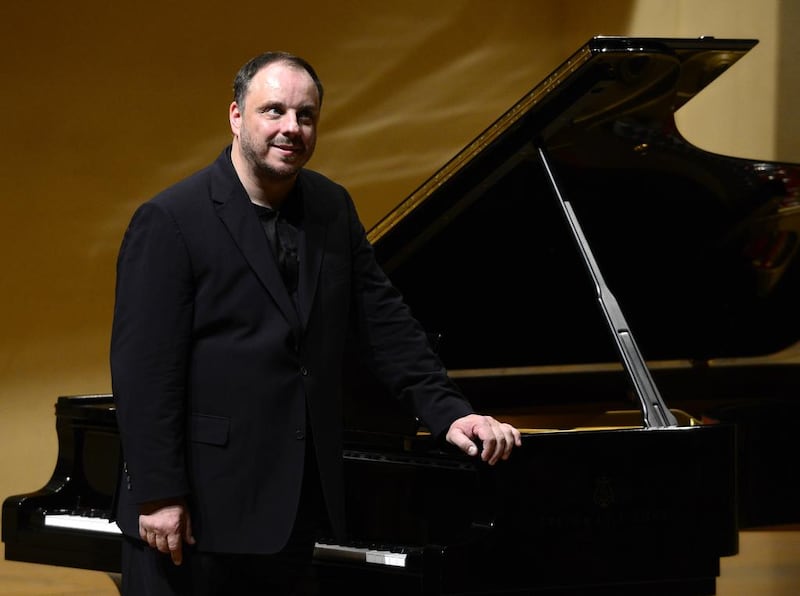Matthias Goerne has sung Schubert's Winterreise more than 200 times over the past quarter century, but every night the German baritone finds new learnings from the celebrated piece.
The classic song cycle, a collection of lieder for solo voice and piano, is among the most renowned examples of the form – a deeply affecting adaptation of 24 poems by Wilhelm Müller charting the solitary, spiritual walk of a spurned lover trekking into the wilderness (Winter's Journey in English). First performed by Goerne in his early 20s, even today, the 49-year-old treads new ground every time he returns to the work, as he will for the closing concert in Abu Dhabi Classics 2015/16 season on Monday.
“The piece is so complex in how humans are, anytime you sing it, you discover little details, or conceive of possibilities,” he says. “By the help of your own imagination, the expression becomes even more personal, even more reflective, depending more in your own past.
“The piece doesn’t make you change, life makes you change, and the piece becomes more interesting through your own life experiences.”
Schubert's own life experiences have been pored over for generations; Winterreise was famously written by the Austrian composer in 1827, aged just 30 but already ill with the syphilis that would kill him a year later. The result is a bleak meditation, contrasting deep melancholy with a bitter sense of irony. While the poetry may probe at the problems of existence – social, political and metaphysical – the compositional power is enough to move any audience. Defining the "art song" for decades to come, the piano is elevated beyond that of saloon accompaniment to both an emotional and impressionistic foil; listen carefully and you can hear the rustling, falling leaves of the winter woods.
“The human self is in the centre – this is the reason you can do it in all the places in the world, and the barrier of language is non-existent,” adds Goerne.
"It's not abstract, it's something people can feel immediately. It's going directly into your heart, not your brain." Among the world's most renowned vocalists, Goerne has recorded more than 30 CDs, including an 11-volume series dedicated to the works of Schubert. He has performed with many of the world's greatest ensembles on many of the grandest stages. But still he ranks the experience of performing Winterreise – a dense single sitting of more than 70 minutes, with some pieces barely a minute long – a challenge greater than any opera.
“Most opera singers cannot imagine singing a song recital,” he says. “They feel totally alone – you have no costume, no set design, nothing theatrical – in the song cycle you have to create, you have make people believe.
“You’re responsible for everything, every little note. You’re almost naked onstage. Perfection has to be so normal. Everything is in your hands – I would say it’s the maximum of culture in classical music for a singer.”
However, classical music is a culture Goerne sees as under threat. Without prompting or bitterness, he launches into attack on the music establishment, claiming younger people see the art form see as “too old, too slow, and not important”, but blaming the “quality” of contemporary productions.
“Maybe classical music used to be very entertaining and fashionable, but in the past 50 years we have found it not so strong after all,” he adds. “Because maybe it’s a little bit flat, maybe a little bit too ordinary, too simple, not challenging enough the questions and the doubts we want to answer.
“If you’re not asking the right questions you’ll never get an interesting answer.”
The only answer, he says, is to close some of Europe’s abundance of concert halls and fold or merge a culture overrun with orchestras.
To accept that classical music is “not the kind of product for billions of people.” One ray of light, he adds, is emerging markets where music has the power to attract a young audience – such as China, and potentially the Gulf.
However, whatever the fortunes of classical music, Winterreise will not be forgotten any time soon.
“This piece is so timeless, so uniquely connected with humans – even 2,000 years ago it would be the right cycle, and I’m quite sure in 2,000 years people will listen to it,” he adds.
"A lot of classical music will disappear – but Schubert's Winterreise will not be one of those pieces."
• Matthias Goerne performs Schubert’s Winterreise at Manarat Al Saadiyat tomorrow from 8pm. Tickets cost Dh80 (Dh30 for students) from abudhabiclassics.ae
rgarratt@thenational.ae





